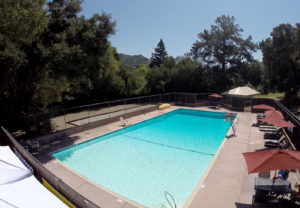
The Difference Between Lifeguards and Pool Monitors/Attendants
By: April Quinones,
The terms lifeguard and pool attendant/monitor are commonly interchanged with each other. However, there are significant differences between the two job descriptions.
In this article, we will discuss the differences between the two: the duties, roles, and responsibilities of each.
Lifeguards
The primary role of a Lifeguard is to supervise, monitor and to rescue in the event of an emergency. They are in charge of ensuring that all the patrons follow the safety measures and rules to prevent injuries and other water accidents.
Lifeguards can be employed by pool administrators, hotels and resorts, beach administrators, and other recreational or community establishments with aquatic activities. Best Practice: When theres bodies of water – lifeguards should be staffed and on patrol.
Facilities with outdoor pools and beach administrations mostly hire lifeguards depending on the season- for example, during the summer. On the other hand, institutions with indoor aquatic activities tend to hire lifeguards throughout the year.
On large beaches, you will often find several lifeguards employed and working during the same time to cover numerous uses and a wide area. In this case, the employed lifeguard works as a team coordinated by the Chief Lifeguard.
Main Responsibilities of a Lifeguard
Here are the main responsibilities of a lifeguard:
- Monitoring and patrolling beaches and pool areas
When monitoring and patrolling, they need to
-
- Look out for any infractions and safety hazards
- Observe the beach or pool users activities in certain areas
- Enforce safety procedures
- Prevent users from getting in the water during bad weather conditions
- Check the environmental conditions such as tides and the weather to prevent hazards
- Warn users of any potential hazards or safety procedures
- Practice preventative lifeguarding skills to avoid injury or accidents from occurring
- Inspecting the recreational equipment
The lifeguard’s role is to inspect the recreational and rescue equipment such as diving boards, ropes, and the floatation device. They review the gear to ensure they are in working condition. After inspection, they need to write up a report on the state of the equipment. If any equipment needs replacement or repair, they should include it in the report.
- Clean the area and maintain the quality of water
For the most part, a Lifeguard is responsible for ensuring pool decks are clean and tidy and that the quality of water is maintained. This may include organizing deck chairs and tables, removing any objects from the water, testing the chemicals in the pool and making necessary adjustments to the chemical levels if needed.
The lifeguard should respond to any emergency in a timely way. That is:
-
- Examine distressed active or passive water users and assess their situation
- Rescue any distressed users and carry them to a safe location
- Activating the alarm (EAP) when need be and closing the beach or swimming pool in the case of an extreme emergency
- Assisting the victim to the best of their availability which might include CPR and the use of an AED.
- Leading the evacuation of an area if necessary, e.g., due to natural disasters or a fire in the building
It is the role of a Lifeguard to write and file reports on the current condition of the beach or pool, any case of emergencies, and any other relevant information.
- Take part in demonstrating safety procedures
A lifeguard can do this by demonstrating to the public or by teaching swimming lessons.
Daily Tasks
The day-to-day activities of lifeguards include:
- Assembling necessary equipment and supplies needed during a rescue
- Closely monitoring activities in the beach and pool
- Call-out infractions or irregularities to ensure the water users comply with set safety rules
- Monitor weather conditions and other aspects such as tides
- Check and regulate the level of chemicals in the pool
- Clean the beach or pool area
- Promptly respond to emergencies
- Administer first-aid or CPR when needed
- Demonstrate and educate on safety procedures.
Skills
Here are some of the essential skills that a lifeguard must posses:
- Excellent physical condition
You need to be healthy and free of any respiratory issues. Be an excellent swimmer and be in a position to carry any distressed swimmer away from the water.
- Good communication and interpersonal skills
To be a lifeguard, you need to convey safety instructions to the users concisely and calmly. You need to call out infractions and other irregularities in an authoritative yet respectful tone. Also, you need to be able to explain any emergencies or injuries to medical personnel.
- Strong awareness and observation skills
One of your roles is monitoring the users to check for any distressed users. Thus, you need to be in a position to monitor the activities of numerous users. Look out for possible safety violations and have a sharp eye to notice any emergencies that may arise.
- Good decision making and stress handling skill
You need to notice an emergency, assess it according to the procedure, and attend to it calmly.
Sometimes you will be needed to work alongside other Lifeguards. Thus, you need to be a good team player and work alongside other team members.
Pool Attendant/Monitors
A pool attendant is hired by a water facility to maintain the pool and the surrounding area. Thus, they maintain the facility. They are primarily responsible for ensuring the safety and enhanced comfort of the pool guests.
Their role is to hand out towels if applicable and ensure the guests follow the set safety rules and renting pool equipment. If need be, they serve as a backup for lifeguards. They are responsible for ensuring the area surrounding the pool is clean, gathering the clean towels, greeting and welcoming the guests, and answering any questions the guests or users may have.
Duties of a Pool Attendant/ Monitors:
- Greet guests upon arrival and check them in
- Make sure social distancing guidelines are being followed
- Sanitize and Disinfect areas of the pool in between groups of swimmers
- Ensure the area around the pool is clean
- Create a good guest relationship by regular engagement and supervision.
Requirements to Serve as a Pool Attendant
Due to the inherent danger in waters, pool attendants are needed to:
- Have basic first-aid training
- Should be proficient swimmers
- Great communication and interaction skills
- Willingness to learn
- Outgoing nature to help them interact with the guests
Differences Between a Lifeguard and Pool Attendant
Having looked at the job description, tasks, and requirements for each, you have probably noticed some of the differences. While a lifeguard can also serve as a pool attendant, a pool attendant cannot assume a lifeguard’s role. Here are some differences between the two:
A pool attendant is hired as facility coordinators. Their main role is to ensure the cleanliness of the surrounding area and the pool or beach and that clients are comfortable. On the other hand, a lifeguard’s main function is to ensure the pool or beach users’ health and safety.
It is the role of a pool attendant to ensure the guests are comfortable. Also, they should help the guests with any issues that may come up. They hand guests chairs, towels, and anything else that the guest might need. Contrary, a lifeguard must never abandon their posts unless there is another lifeguard to hold their position.
Thus, if a guest needs any assistance, a lifeguard will direct them to a pool attendant. A lifeguard needs to monitor the pool area without attending to guests unless in distress.
Depending on the recreational facility, a lifeguard can help test the water and maintain the optimal chemical level. However, the lifeguard’s role is to ensure that the pool remains clean and safe for users.
Meanwhile, a pool attendant can help take an occasional chemical reading of the water. However, not all pool attendants are certified to deal with pool chemicals. Thus, chemical levels should be left to the pool manager, AFO or CPO to handle.
A lifeguard can opt to help clean and maintain the pool area during their free time or after their duty. However, during working hours, a lifeguard’s main role is to ensure the safety of the users by enforcing the facility’s safety rules. On the other hand, it is the main duty of a pool attendant to ensure that the pool area is clean and ready for use.
A lifeguard should always be ready to respond to any emergency cases to save the swimmers’ lives. Lifeguards are trained in CPR/First-aid/AED and how to monitor the safety of the guests. Thus, their main role in the beach or pool is to prevent injuries and drowning.
On the other hand, a pool attendant may have basic life-saving skills and should be on standby to help the lifeguard when needed. However, while the lifeguard handles an emergency, a pool attendant must ensure the guests remain calm and receive any necessary services.
A lifeguard is tasked with understanding all the safety rules of the facility and enforcing them. It is their responsibility to monitor how the users are using the pool and ensure the swimmers are having fun safely.
If the lifeguard notices anyone going against the rules, they must explain the rules and understand the rules that need to be followed for their safety.
Meanwhile, the pool attendant deals with guests very often. They can also remind guests about the rules and urge them to follow them. However, it is mainly the duty of the lifeguard.
Final Words
Now, you understand who a lifeguard and pool attendant is, their job descriptions, and the skills they need to possess. You now understand the difference between a lifeguard and a pool attendant/monitor. The main difference is that a lifeguard focuses on the users’ safety.
In contrast, a pool attendant focuses on maintaining the area’s cleanliness around the pool and assisting guests with their needs. While a lifeguard can assume a pool attendant’s responsibilities, a pool attendant cannot take up a lifeguard’s role.
For more information on either our pool monitor services or lifeguard management services, please see: corporate services
This article is brought to you by The Swimming Swan
from Swim Lessons and Private Lifeguard Services https://theswimmingswan.com/the-difference-between-lifeguards-and-pool-monitors
via https://theswimmingswan.com
 Community Homeowners Associations and Pool Monitor Services
Community Homeowners Associations and Pool Monitor Services
